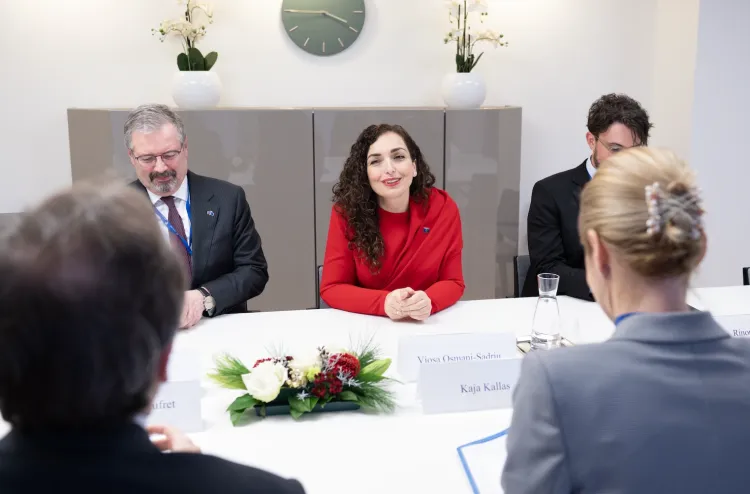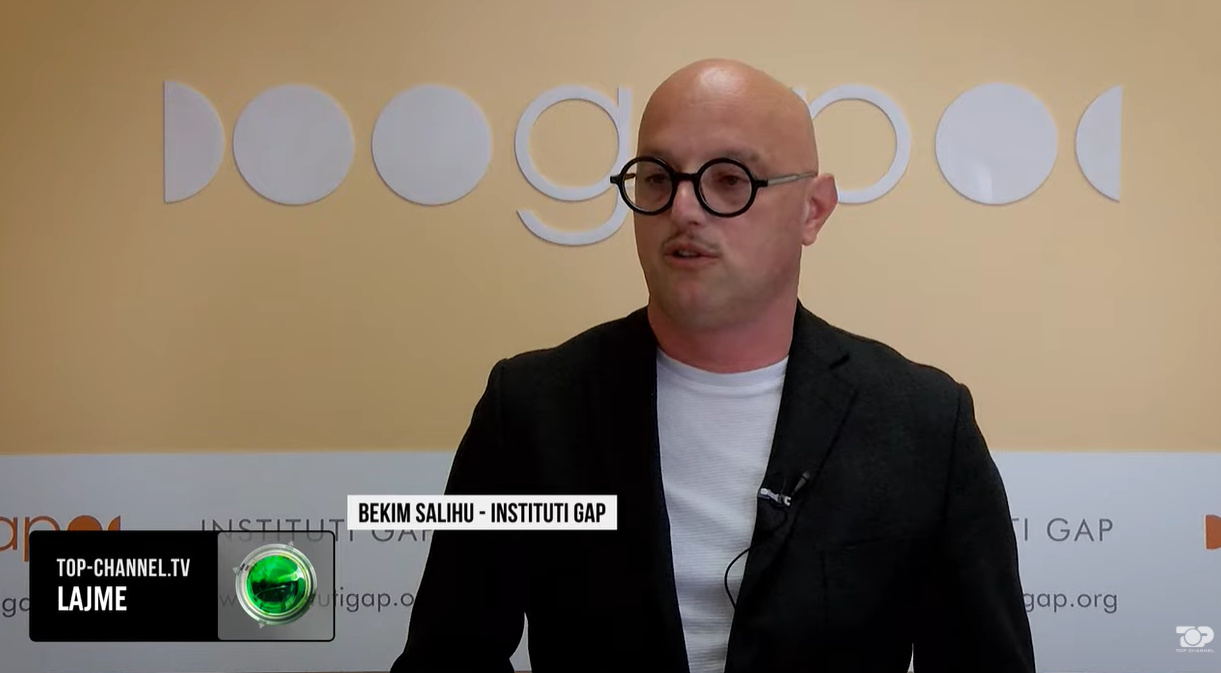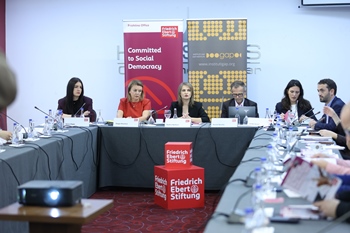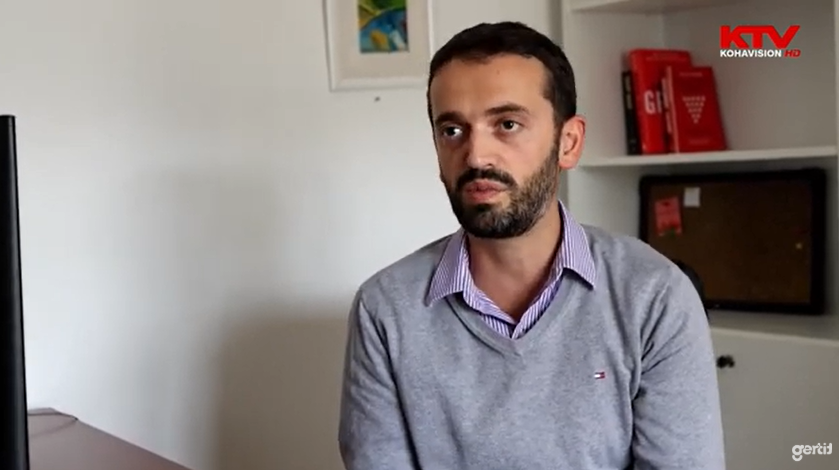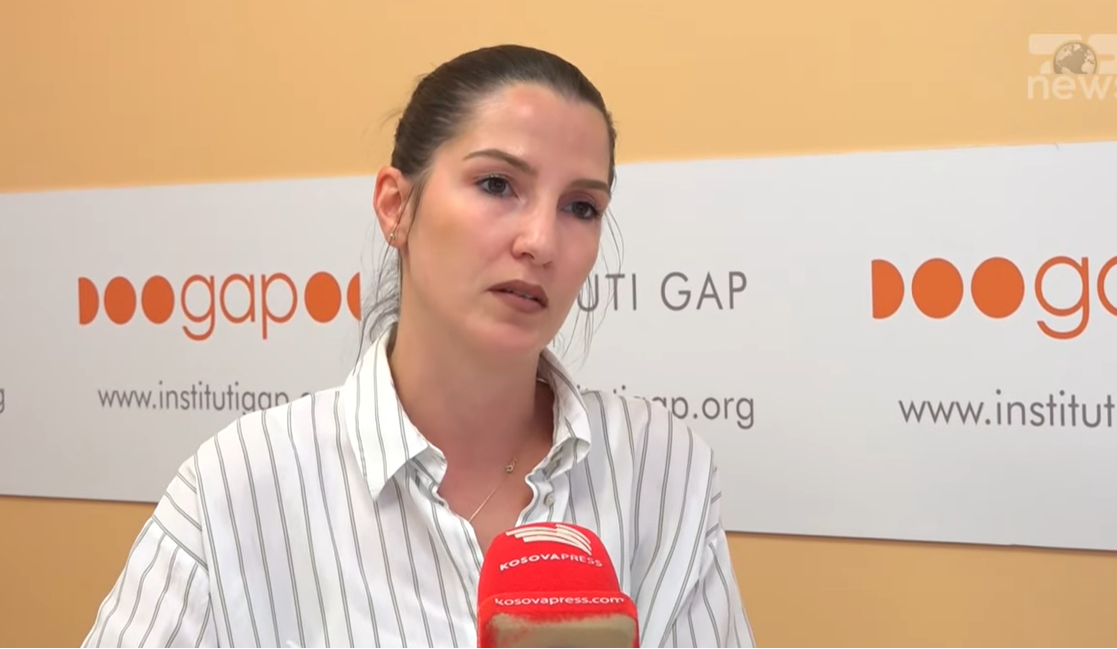Inclusion of Women, Youth and Non-Majority Communities in the Economic Recovery Package
12/02/2021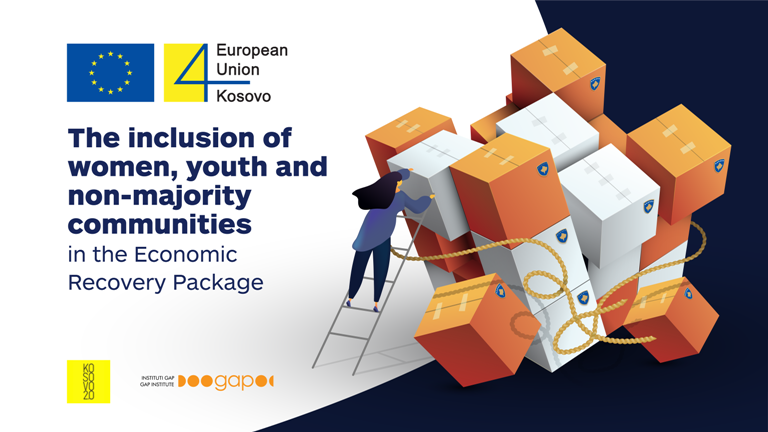
This research was conducted by Fjolla Mucaj, within the Mentoring Project, supported by the European Union and implemented by Kosovo 2.0 and GAP Institute.
Introduction
The findings of this research show that the economic crisis caused by the COVID-19 pandemic in Kosovo hit hard women, youth and non-majority communities. Women unemployment rate at the beginning of the pandemic ranged around 31%. The economic insecurity caused by the pandemic harmed all businesses and industries in Kosovo, with 65% of women-owned businesses not operating at all during the lockdown, and around8% of women who lost their jobs at the very outset of the pandemic. On the other hand, time spent on doing unpaid housework has increased significantly for women than for men. According to United Nations Development Program (UNDP), around 42% of women, compared to 19% of men were forced to work from home during the pandemic.
Youth unemployment reached also very high levels at the beginning of the pandemic, exceeding 46%. According to Kosovo Agency of Statistics (KAS), at the very outset of the pandemic, the youth were twiceas likely to be unemployed, compared to the adults, while Roma, Ashkali and Egyptian communities remain the most vulnerable group in the society in the times of the pandemic, with high unemployment rate and extreme poverty.
Despite the vast needs of these social groups, their inclusion in the Economic Recovery Package is not adequate. The measures envisaged for these groups are inappropriate, both in terms of the budget and the criteria on the basis of which this package was drafted. Consequently, a program is lacking, based on the needs and damage caused by the pandemic to these groups.
The economic and social inclusion of women, youth and minority communities are at the core of every countrys economic recovery measures. The unfavorable position of women in business, youth on the labor market, as well as the position of the Roma, Ashkali and Egyptian communities in Kosovo society, has further deepened their insecurity and difficulty during the pandemic.
In order to assist the countrys economy, on 13 August 2020, at its 23rd meeting, the Government adopted Economic Recovery Package amounting to 365 million Euros, consisting of 15 recovery measures. Measure seven is dedicated to youth, measure nine to non-majority communities and measure ten to women.
Table 1. Three measures from the Economic Recovery Package
|
Measure |
Measure Description |
Amount |
|
Measure Seven |
Financial support for youth employment, support to civil society organizations, other informal groups, stimulus for cultural, artistic, sports activities and their vitalization |
5,000,000 € |
|
Measure Nine |
Support to non-majority communities in the Republic of Kosovo, for projects and initiatives aimed at improving their lives and economic revitalization |
2,000,000 € |
|
Measure Ten |
Financial support to projects and initiatives aimed at improving the position of women in the society and economy |
2,000,000 € |
Source: Kosovo Government
This report provides a brief analysis of the inclusion of these three groups in the Economic Recovery Package, by reviewing how it meets their needs and offers examples from other countries practices in providing financial assistance to women and youth.
Inclusion of Women in the Economic Recovery Package
Various reports underline that women are more economically affected than men, by the crisis caused by COVID-19 pandemic. According to Eurofund, this pandemic presents a serious risk of rolling back decades of gains achieved in gender equality. While some of the unequal gender impacts of the current crisis may be temporary and may evolve at a later stage, this study finds that, it can have long-term consequences,especially in developing countries.
However, even before the pandemic,the situation in Kosovo has been critical in terms of the social and economic life of women. The rate of women inactivity in the labor market is concerning and it reaches 79.7%, implying that only about 123 thousand women are active or seeking a job. According to Kosovo Agency of Statistics, women employment is only 14.1%, and it ismuch lower compared to men, whose employment rate reaches 44%. Women are mainly employed in the education, trade and healthcare sectors, while 60% of women work in the private sector. Also, women, who occupy 60% of jobs in public health institutions, are at the frontline of the crisis caused by COVID-19. However, 30% thereof work without contracts in the informal service sectors. What remains concerning is that this already low number of employed women may decrease further during the pandemic, due to closure of businesses and job cuts. According to UNDP assessment, after the outbreak of COVID-19 pandemic in Kosovo, around 8% of respondents lost their jobs.
The pandemic did great harm to businesses and especially the small ones. According to a survey conducted by the American Chamber of Commerce in Kosovo, of 166 women business owners, 68% of them faced difficulties in terms of their economic well-being during the pandemic, and around 65% of their businesses were completely or partially closed during the lockdown.
Through measure ten of the Economic Recovery Package, the Government envisaged financial support for projects and initiatives aimed at improving the position of women in the society and economy, in the amount of 2 million Euros. According to Gender Equality Agency, measure ten is directly applicable within the objectives of inclusive growth and preschool education, outlined in Kosovo Development Strategy and is in line with a series of activities within the Kosovo Gender Equality Program 2020 – 2024. The first group that will benefit from this fund are private preschool education institutions (private kindergartens) and preschool education institutions registered as NGOs (private kindergartens) licensed by the Ministry of Education and Science (MES). Total amount allocated for this purpose within Measure Ten is one million Euros. Meanwhile, the second part of the package has not been executed yet, and according to the Gender Equality Agency it will most likely be executed for small women businesses and non-governmental organizations doing community work (Interview with the Director of the Gender Equality Agency, Edi Gusia).
Women make up half of the population and the high rate of women inactivity in the labor market, the high unemployment rate and the high number of women working without contracts prevent most of them to benefit from this measure. The main issue remaining is that the package does not support women working in the informal sector (Interview with the Director of the Kosovo Gender Studies Center, LuljetaDemolli). Also, in terms of the implementation of one million Euros in assistance to private pre-school institutions, they are intended for rent and operating costs of kindergartens, however this component does not impact women affected by the pandemic to recover economically.
On the other hand, measure ten does not include single mothers affected by the pandemic. Neighboring countries, such as North Macedonia, in one of its measures included payment cards in the amount of 6 thousand denars (around 97 Euros) to be received by single parents.
Inclusion of Youth in the Economic Recovery Package
The inclusion of youth into social and economic life during the pandemic has been hampered. The International Labor Organization (ILO) warned that one in six youth will lose their jobs, and 13% of them have no access to courses, teaching or training. In Kosovo, around 55% of the whole population are under the age of 30. According to KAS, the youth unemployment rate is 49.1%. On the other hand, the percentage of young people who are not employed, neither in education, nor in training aged 15-24, reaches 34.1%. Whereas, this number is higher among young women with 60.2%, compared to 47.1% of young men. On the other hand, according to KAS, informality is wide-spread among young people. Almost half (48.2%) of employed young people aged 15-24 work in the informal sector. According to a World Bank report on Labor Market on the Western Balkans, Kosovo has the highest youth unemployment rate in the region.
The socio-economic consequences of the pandemic have hit young people in Kosovo harder than other age groups. According to UNDP assessment, 12% of those aged 18-24, lost their jobs, while 45% thereof suspended their work provisionally, at the outset of the pandemic. Discontinuing education, training or learning makes it even more difficult to find a job in the near future. The construction, gastronomy and trade sectors that have been hit hardest by the pandemic employ 33% of young employees. These sectors also face the highest degree of informality and consequently the dismissal is a lot easier.
In order to help the young people during the pandemic, the Government of Kosovo envisaged financial support for youth and informal organizations, stimulus for cultural, artistic, sports activities and their revitalization, in the amount of approximately five million Euros through Measure Seven within the Economic Recovery Package. This aims to promote the mobility of youth for education in the European Higher Education Area, to strengthen the capacity of youth organizations, as well as develop schemes to support youth employment, subsidize young entrepreneurs, facilitate the transition from school to employment and internship opportunities.
In terms of youth employment, Ministry of Culture, Youth and Sports (MCYS) selected a total of 167 beneficiaries within the public call for public financial support to increase employment through start-up grants, which is published every year. In addition, in terms of the damage caused by the pandemic to youth employment, the MCYS has so far signedonly one initiative in the amount of 500 thousand euros with UNDP, foreseen under Measure 1 of the action plan related to the distribution of the recovery fund to MCYS sections, supporting 400 youth with internship opportunities, with the latter undertaking its implementation.[1] However, the Youth Department, specifically the Office for Youth Employment has not been involved in the distribution of this budget. According to them, this budget is not sufficient, compared to the impact of the pandemic against young people and employment growth in this group (Interview with an MCYS employee who wishes to remain anonymous).
Other countries, such as North Macedonia supported students since May, by allocating a package worth 355 million Euros, 12 million Euros for youth, including 3,000 denars (48 euros) to be spent on local produce and services, financial support of up to 6,000 denars (96 Euros) to cover the cost of university education as well as facilities in registering for accommodation, for students coming from low-income families.
Inclusion of Roma, Ashkali and EgyptianCommunities in the Economic Recovery Package
The Roma, Ashkali and Egyptian communities unfortunately remain among the groups most discriminated against in Kosovo. This community is also facing severe natural disasters and economic crises. According to an OSCE assessment, the situation of Roma, Ashkali and Egyptian communities in Kosovo has improved, however the figures still point to a worrying situation.
Unemployment rate of youth from Roma, Ashkali and Egyptian communities is around 75%. Another concern is the lack of registration of members of these communities as unemployed in the employment centers. According to data, only 3 Roma, 88 Ashkali and 5 Egyptian community members registered as unemployed in April 2020 in Ferizaj; 17 Roma, 69 Ashkali and no Egyptian members in Lipjan and only 2 Roma, 13 Ashkali and 3 Egyptians in FushëKosovë.
In terms of improving the position of these three communities in Kosovo society, most of them attribute this improvement to assistance from civil society and international organizations rather than to local institutions. Also, during the pandemic, food and hygiene supplies were distributed by various local and international organizations such as UNICEF, GAIA Kosovo, as well as by active volunteers (Interview with representatives of organizations from Roma, Ashkali and Egyptian communities).
Measure Nine of the Economic Recovery Package envisages two million Euros to support projects and initiatives aimed at improving the lives and economic revitalization of non-majority communities. Office for Community Affairs published a call for non-governmental organizations and small enterprises with three objectives: providing subsistence for people in need from non-majority communities, including sending food and hygiene packages, mitigating the economic consequences of the pandemic for small enterprises, includingemployment assistance for small enterprises andnon-majority communities, and provision of assistance to abandoned and ill persons, including psychological one. This office aims to achieve its objectives through a public call for submission of project proposals aimed at non-governmental organizations and small enterprises, which will carry out activities Kosovo-wide. Thus far, the scale of implementation of activities within these objectives is unknown.
According to the Network of Roma, Ashkali and Egyptian womens organizations, during this period their challenges while working in the community have been substantial, especially for essential supplies. According to them, the amount allocated for minority communities is not sufficient compared to the previous state of the communities and the damage brought about by the pandemic (Interview with the Director of the Network of Roma, Ashkali and Egyptian Women Organizations, ShpresaAgushi).
Conclusions and Recommendations
The findings of this research paper reveal that the amount of two million Euros for women affected by the pandemic is insufficient given the impact of the pandemic and the previous state of women unemployment. The criteria used to implement Measure ten do not target groups severely affected by the pandemic, such as women working in the informal sector. Also, the second part of Measure ten has not been implemented yet and it may have even greater consequences for womens businesses, as the number of employed women may get even lower during the pandemic due to business shut-downs and job cuts.
On the other hand, Measure seven, which foresees support for youth, has not yet been the properly implemented. The activities envisaged within this measure, point to a lack of proper planning to support low-income students, as in the case of North Macedonia, and support students from strategic areas for our country.
Roma, Ashkali and Egyptian communities face high levels of poverty. Aid during the pandemic came primarily from volunteers, who supplied them with food and hygiene items. It is not known to what extent was Measure nine in the Recovery Package implemented.
Overall, the public consultation process in drafting these three measures did not include sufficiently the categories affected by the pandemic. In this context, the following is recommended:
- 2021 Recovery Package should include specific measures for self-employed women, employees in the informal sector, as well as support for women with low-income or working part-time, who cannot meet their family needs, especially when these women are single parents;
- Provide financial assistance to students whose families may have been affected by the pandemic, and especially those from rural areas, by providing them means to cover dormitory and food expenses. Special attention should be paid to assisting students from fields such as IT or medicine, that are crucial for the economic and social development of Kosovo;
- Develop practical and effective measures promoting equal access to education, employment, health and housing for Roma, Ashkali and Egyptian communities;
- When drafting new economic packages related to the pandemic, the Government institutions, should include as many representatives of civil society organizations and other institutions as possible, so that the designed measures have a larger impact and include all those in need.
This report has been published within the first cycle of the Mentorship Program which aims to enhance research and writing skills for young researchers and journalists through the mentoring by senior researchers and journalists at GAP Institute and Kosovo 2.0.
The report has been published with the assistance of the European Union. The contents of this publication are the sole responsibility of GAP Institute and Kosovo 2.0, and do not represent the views of the European Union.The EU funded project "Innovation for resilient media and citizen engagement" is implemented by: Kosovo 2.0 and GAP Institute.
The report is also available in Serbian language, please write at info@institutigap.org.




